Bonnie Brown
Bonnie Brown: Q&A with Ole Miss Retirees Doug and Shirley Stuart
*Editor’s Note: The latest installment in the Ole Miss Retirees features is Doug and Shirley Stuart. Shirley worked in the Chancellor’s Office and Doug in the Student Union. The organization’s mission is to enable all of the university’s faculty and staff retirees to maintain and promote a close association with the university. It is the goal of the Ole Miss Faculty/Staff Retirees Association to maintain communication by providing opportunities to attend and participate in events and presentations.
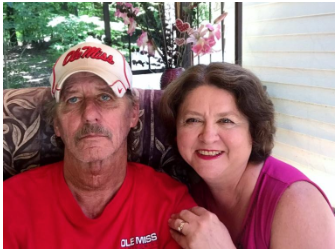
Doug and Shirley Stuart
I have known Shirley and Doug Stuart for lots of years. They both grew up in Oxford and were connected to Ole Miss long before they began their careers on campus. They each have had a career beyond their Ole Miss days. Great couple, great friends.
Brown: Where did you grow up? What is special about the place you grew up?
Shirley Stuart: I did not live in the city limits of Oxford but instead lived about 12 miles out of town, so I was a “county girl”.
Doug Stuart: The majority of my childhood was spent in Oxford. Because my dad was a career military officer we lived in several different places. I was born in Stuttgart, Germany in a military base hospital. Then we came to Oxford the first time in 1958. Later my dad was transferred to Colorado Springs, Colorado and I lived there from ages 6 to 8. We came back to Oxford in 1964 when my dad was Commander of the Ole Miss Army ROTC unit.
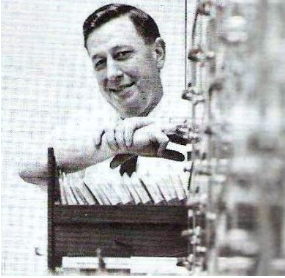
Colonel Whitney D. Stuart
Photo provided by John Cofield
Brown: Please talk about your parents, siblings, crazy aunts and uncles.
Shirley Stuart: I have an older sister, a younger sister and younger brother.
Doug Stuart: I have two older sisters and a younger sister.
Brown: Tell us about your childhood.
Shirley Stuart: We were fortunate to have grown up in a time when kids wanted to play outside all day and only had to be home before dark without anyone worrying about us. We rode bicycles or walked up and down two-lane country roads, swam in lakes and ponds. There was never a curfew. You came home when it got dark or when you got hungry. It never occurred to us to sit in the house all day watching a TV screen. We made our own fun.
Brown: What is your most cherished childhood memory?
Shirley Stuart: One of my most cherished memories as a very young child is attending Vacation Bible School. Lining up outside the front door of the church and marching in behind the older kids who got to hold the flag was exciting. Of course, making all the crafts with popsicle sticks and macaroni pasta, was fun and learning Bible verses and being so proud when you didn’t forget the words in front of everyone in the auditorium on the final night was a relief. I remember a lady who brought cookies and Kool-Aid in a big metal cooler every day that week and she would sit the cooler on the tailgate of her old pickup truck and fill up our paper cups with Kool-Aid. I mean, for a 5 or 6-year-old kid, that was the best part of the day.
Brown: What were you really into when you were a kid?
Doug Stuart: As a kid, I was fascinated by helicopters and always wanted to fly them. Although I did my share of playing with army jeeps, tanks, and toy soldiers I wanted to be a helicopter pilot.
Brown: Where did you go to school?
Shirley Stuart: I attended Lafayette schools from first through twelfth grades. Proudly I can say that I was in the very first class to start at Lafayette the first year the school opened.
Doug Stuart: I attended Oxford schools.
Brown: What was your very first job?
Doug Stuart: My first job was after high school and during summers working at what used to be the Ole Miss Service Station located at the four corners of University Avenue. I was hired by Mr. Alexander when I was 18 and I worked for $1.86 per hour.
Brown: Tell us how/when your Ole Miss “story” began? Who hired you? How long did you work at Ole Miss? What were your job responsibilities?
Shirley Stuart: Since I had no idea what I wanted to do after high school I delayed taking college courses and instead interviewed for my very first job at University of Mississippi Printing Services with Mr. James Parks. Back then it was located on the second floor of Weir Hall. I graduated from high school in May 1977. I was still 17 and didn’t turn 18 until August but he hired me anyway. I worked there for 8 years as a typesetter. I think the main reason I got the job was because me and the other lady I worked with in the typesetting room had the same high school typing teacher and she gave me a great recommendation. This was long before desktop publishing was ever heard of. We used the old paper punch tape varitype machine and magnetic film strips that you had to get up and change every time a customer wanted to change type fonts. It was great experience and a skill I never would have learned otherwise. I enjoyed my years working at Printing Services and had a close working relationship with all the people who worked there, but an opportunity to work in the Chancellor’s Office came along and I couldn’t turn that down.
I will forever be grateful to Ms. Leone King for giving me an opportunity to work in the Chancellor’s Office. She must have seen some potential in a very young, inexperienced girl and she taught me everything about working in a high-profile office setting. She taught me invaluable lessons about self-control, composure, self-confidence, grace, work ethic and protocol. I worked in the Chancellor’s Office from 1986 until I retired in 2010. I believe at one time or other throughout all those years of working in that office I held every clerical position available from file clerk to ultimately becoming Secretary to the Chancellor. And if I’m not mistaken, I believe that when I retired, they also retired that title.
Doug Stuart: In 1976 I began working at Ole Miss full-time when Mr. Bob Towery hired me on his staff to oversee the Student Union. At that time there was a game room where students could play video games and shoot pool and relax between classes. I hired all the student workers and scheduled and set up all the conference rooms for meetings and special events. I eventually was promoted to Assistant Director of Operations and continued working in the Student Union for 28 years. I retired in 2004.
Brown: What did you know about Ole Miss before you accepted a position here?
Doug Stuart: My Dad was an administrator in the Division of Student Life. So, I knew a great deal about the University and Oxford at an early age.
Brown: Describe your most memorable day(s) at work.
Shirley Stuart: I was fortunate enough to work in the Chancellor’s Office for many years, and met many important dignitaries ranging from elected government officials, professional athletes, authors, and celebrities. Some of these included getting autographs from athletes Archie and Peyton Manning, Charles Barkley, and a photo with Morgan Freeman. I escorted actor Gerald McRaney around campus and met two former Miss Americas, Lynda Mead Shea and Mary Ann Mobley. Aside from standing behind John Grisham in the cashier line at a local grocery store once I met him many times when he came to visit Chancellor Khayat. There were many memorable moments. But one time that seemed particularly special was being invited to lunch at the Chancellor’s Home after Vice President Dan Quayle gave the Commencement address in 1990. I passed through the receiving line, introduced myself and shook hands with then-Vice President of the United States! I even have the picture to prove it.
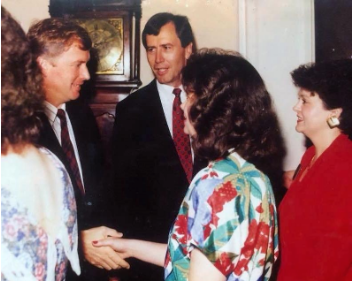
Former Vice President Dan Quayle, former Chancellor Gerald Turner, and Shirley Stuart (in red), May 1990 Photo by Ole Miss Photography.
Doug Stuart: In 1992 Mike Stewart was Chief of Police at Ole Miss and he initiated a voluntary Reserve Officer Training Course. I enrolled in the first class and upon successful completion of six weeks of intense training, I received my certificate. That was a memorable day. I still have it framed and hanging in my shop.
Brown: You have had a second career at USDA-ARS. Please talk about this.
Shirley Stuart: I never really intended to start another career once I retired from Ole Miss but a part-time position with the US Department of Agriculture sort of just happened. I knew I wasn’t ready to sit home without anything to do day after day and working a few hours a day gives me a reason to get out of the house and see people and it keeps my mind sharp. I’ll keep doing that for a couple of more years and then I truly am going to retire for good the next time.
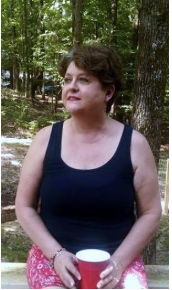
Shirley Stuart
Brown: I know you had a second career in retail. Tell us about that.
Doug Stuart: The Walgreens job just kind of fell in my lap. I had been retired about a year and a friend of mine was the head pharmacist there and he called up one day and asked me “do you have a college degree?” I said yes, and he said put in your application right now. We need a new assistant manager. That’s how it happened, and I worked there for nine years. But after that point, I knew I was ready to retire for good this time.
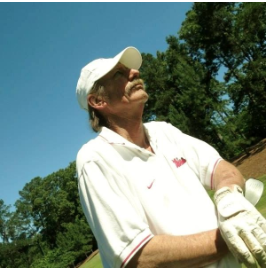
Doug Stuart
Brown: What are the most useful skills you have?
Shirley Stuart: I am a planner and very organized. I guess you can call those useful skills.
Brown: What skills would you like to learn?
Shirley Stuart: The one thing I’ve always wanted to do is learn to play piano. I took lessons in elementary school for a year or two but was never serious about it. Now, I think it’s something I would like to try again. Since I don’t own a piano I suppose if I ever really do get serious about it, I will have to buy one.
Brown: Talk about the best day of your life and why it was the best day.
Doug Stuart: Other than getting married and when our two sons were born, I think my dad being inducted into the Ole Miss Army ROTC Hall of Fame and attending that ceremony and accepting the award for him posthumously is probably one of the best and meaningful events in my life.

Whit, Doug, and Andrew Stuart Photo provided
Brown: What’s an ideal weekend for you?
Shirley Stuart: An ideal weekend for me is to have zero plans or commitments.
Brown: Do you consider yourself an introvert or extrovert?
Shirley Stuart: I consider myself an introvert and would always rather shine behind the scenes than be in the spotlight.
Brown: Do you have a favorite TV show that you never miss?
Doug Stuart: I try hard not to miss watching American Ninja Warrior when it’s on.
Brown: How have your goals changed over your life?
Shirley Stuart: Someone told me a long time ago that I needed to always set goals. When you achieve one goal then cross if off your list and add a new one. I think that’s a pretty healthy attitude.
Doug Stuart: When you’re younger, married, and raising a family you’re constantly setting goals that you hope will result in a better job to make more money so I could provide more for my family and that was my definition of success. But now, I’m right where I want to be. Our two sons are grown with their own families and Shirley and I can focus on what makes us happy. I don’t need to set goals now and I have very little, if any, stress.
Brown: What is the most important life lesson for someone to learn?
Doug Stuart: I guess an important life lesson to learn is that you can’t please everyone, so stop trying. At the end of the day when you look in the mirror you want to be happy with what’s staring back at you.
Brown: What advice would you give your 21-year-old self?
Doug Stuart: My advice to my 21-year-old self would be to finish your college degree—which I finally did! Back then I just didn’t see the importance of it because I already had a job. But one day my boss had a conversation with me that made me realize that by not finishing my degree, I was closing the door for any chance of advancement or promotion in the future. Sure, other people, including my dad, had told me the same thing a hundred times before, but I guess it was different when it was my boss saying it. Both Shirley and I were fortunate enough to take advantage of the staff tuition scholarship opportunity while we worked there, and we both have bachelor’s degrees from Ole Miss.
Brown: What is your guilty pleasure/time-waster?
Shirley Stuart: I am perfectly happy at home looking up recipes on my laptop or crocheting, reading or playing with our two dogs. We have a 6-year-old shepherd/collie mix named Sadie and a 2-year-old purebred golden retriever named Molly. I would consider crocheting my guilty pleasure. I can sit for hours alone in a room and crochet. I joke sometimes that it’s my therapy time.
Doug Stuart: For me, a good day of fishing is the best way I know how to waste time. I take a deep-sea fishing trip every summer with a group of about 10 friends to Dauphin Island, Alabama.
Brown: What five words would your friends use to describe you?
Doug Stuart: I’d like to think my friends would describe me as honest, reliable, trustworthy, unselfish and fun to be around.
Brown: What’s the best and worst part of getting older?
Shirley Stuart: I don’t have any real issues with getting older. I just hope I can gracefully ease into it. I guess one of the best things is that at this point you can afford to be a little selfish and put yourself first for a change. Maybe the worst part will be all the doctor appointments that will inevitably be around the corner.
Brown: What’s left on your bucket list?
Shirley Stuart: I don’t think I have a bucket list. Neither Doug nor I enjoy traveling very much but now that we have our first grandchild, we’re finding ourselves on a plane to Utah a lot more than we would have imagined. The one trip we both would like to make someday is to Ireland. Not sure that will ever happen, but if there was a bucket list I’m sure that would be on it.
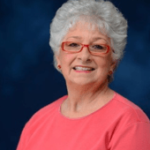 Bonnie Brown is a retired staff member of the University of Mississippi. She most recently served as Mentoring Coordinator for the Ole Miss Women’s Council for Philanthropy.
Bonnie Brown is a retired staff member of the University of Mississippi. She most recently served as Mentoring Coordinator for the Ole Miss Women’s Council for Philanthropy.
She can be contacted at bbrown@olemiss.edu.














